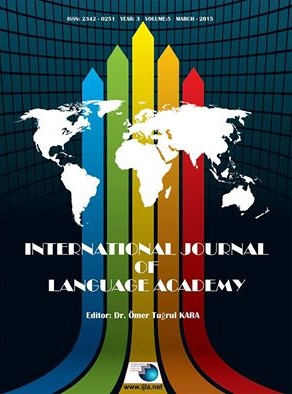BİR ERKEN İNGİLİZ DİLİ BÖLÜMÜ ARAŞTIRMA METODUNUN ANATOMİSİ: TEORİDE VE PRATİKTE KAYNAKLAR VE PARALELLER
Author :
Abstract
Amerikan İç Savaşından sonra, Amerikalı eğitim reformcuları ülkenin yükseköğretim kurumlarını dönüştürme işine koyuldular. Bu amaçla o dönemki Alman üniversitesi modelinden yoğun alarak ödünç almanın yanı sıra öğretim ve araştırmanın farklı akademik bölümlere ayrılması gibi bazı önemli yenilikler de sundular. İngiliz Dili bölümleri Amerikan üniversitelerinde ilk olarak 1870ler ve 1880lerde kuruldu. Bu bölümlerin teşkilatlanmasında yeni nesil üniversite rektörleri, ileri dil ve edebiyat çalışmaları yapmak için Almanya’ya gitmiş olan genç Amerikalılara başvurdu. Alman filoloji teorisi ve metodunda öğrenim görmüş olan bu araştırmacılar da bölümlerindeki öğretim ve araştırmaları filoloji çizgisinde düzenlediler. Yeni yüzyılın başında ise İngiliz Dili bölümleri, yönlerini ilk odak noktaları olan Alman linguistik filolojisinden Alman kültürel filolojisinin daha geniş perspektifine çevirdiler. Bu makale, kültürel filolojinin teori ve metotlarını kısaca inceleyecek ve daha sonra kültürel filolojinin temel hermenötik metotlarından biri olan kaynak ve paralellerin incelenmesinin gerçek araştırmalarda nasıl kullanıldığını tartışacaktır. 20. yüzyılın ilk yirmi yılı boyunca bu hermenötik; farklı tür araştırmaları başlatmaya ve doğrulamaya hizmet etmiş ve üniversite öğrencileri ve halka hitap eden dergi makaleleri, akademik monograf ve akademik edisyonlarda da görüldüğü gibi İngiliz Dili bölümleri araştırmalarının belki de en yaygın şekliydi.
Keywords
Abstract
After the Civil War, American educational reformers set about transforming the nation’s higher educational institutions: to do so, they borrowed extensively from the contemporary German university model, but also introduced several important innovations, including the division of teaching and research into discrete academic departments. English departments, along with many others, were first established in American universities in the 1870s and 1880s. To organize these departments, the new breed of university presidents turned to the young Americans who had traveled to Germany in order to pursue advanced studies in language and literature. Trained in German philological theory and method, these scholars quickly organized departmental teaching and research along philological lines. Around the turn of the century, English-departments shifted from their initial focus on German linguistic philology to a focus on the broader vistas of German cultural philology. This article will briefly examine the theories and methods of cultural philology and will then discuss the ways in which one of its central hermeneutic methods, the investigation of sources and parallels, was used in actual research. During the first two decades of the twentieth century, this hermeneutic served to motivate and justify diverse kinds of investigation and was perhaps the dominant form of English-department research as is evidenced by its prominence both in journal articles and scholarly monographs and in scholarly editions intended for undergraduates and the general public.
Keywords
- Amsterdamska, O. (1987). Schools of thought: The development of linguistics from bopp to saussure. Dordrecht: D. Reidel.
- Bledstein, B. J. (1976). The Culture of Professionalism: The middle class and the development of higher education in america. NY: Norton.
- Boeckh, A. (1968). On ınterpretation and criticism [Encyclopaedie und Methodologie der philologischen Wissenschaften (1877; 2nd ed., 1886)]. Trans. John Paul Pritchard. Norman: U of Oklahoma P.
- Bolter, J. (1980). “Friedrich August Wolf and the scientific study of antiquity.” Greek, Roman and Byzantine Studies 21 (Spring), 83-99.
- Dowling, L. (1986). Language and decadence in the victorian fin de siècle. Princeton: Princeton UP.
- Graff, G. (1987). Professing literature: An ınstitutional history. Chicago: U of Chicago P.
- Grafton, A. (1981). “Prolegomena to Friedrich August Wolf”. Journal of the Warburg and Courtauld Institutes 44, 101-129.
- Harpham, G. G. (2009). “Roots, races and the return to philology.” Representations 106.1 (Spring), 34-62.
- Herbst, J. (1965). The German Historical School in American Scholarship: A study in the transfer of culture. Ithaca: Cornell UP.
- Herder, J. G. (1966). Essay on the Origin of Language [Über den Ursprung der Sprache, 1770]. In On the Origin of Language: John-Jacques Rousseau, Essay on the Origin of Languages; Johann Gottfried Herder, Essay on the Origin of Language. Trans. John H. Moran and Alexander Gode. NY: Frederick Ungar.
- Jankowsky, K. R. (1972). The neogrammarians: A re-evaluation of their place in the development of linguistic science. The Hague: Mouton.
- Klein, J. (1979). “On the function and meaning of theory, ıntellectual and social history for a reconstruction of German "'Anglistik" as a Rational Discipline.” Zeitschrift für allegemeine Wissenschaftstheorie 10.2, 253-266.
- Paulsen, G. (2013). “The study of language and literature in the traditional American college (1638-1870).” Celal Bayar University Journal of Social Sciences 11.2, 28-49.
- Sampson, G. (1985). Schools of linguistics: Competition and evolution. London: Hutchinson.
- Veysey, L. R. (1965). The emergence of the American university. Chicago: U of Chicago P.





